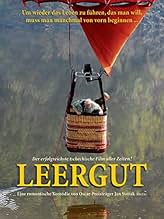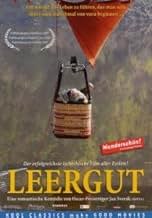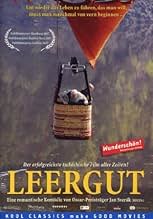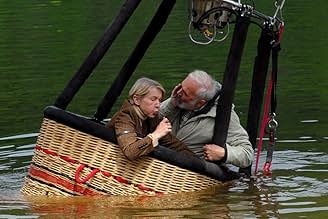Vratné lahve
- 2007
- 1 h 44 min
AVALIAÇÃO DA IMDb
7,2/10
5,2 mil
SUA AVALIAÇÃO
Adicionar um enredo no seu idiomaA comic love story about a man who refuses to accept that old age is empty of love, meaning and value to society.A comic love story about a man who refuses to accept that old age is empty of love, meaning and value to society.A comic love story about a man who refuses to accept that old age is empty of love, meaning and value to society.
- Prêmios
- 10 vitórias e 12 indicações no total
Tatiana Dyková
- Helenka
- (as Tatiana Vilhelmová)
Nela Boudová
- Ptácková
- (as Nella Boudová)
Avaliações em destaque
10P-frish
We saw this film when it was first released in Prague, bought the screenplay in Czech, and now own the DVD. This masterpiece from the father-son Sverák team is a gentle low-key story that has appealed here to all ages. It was the most popular movie of the year in terms of theater attendance. The theme is "the search for love" in its very broadest sense, with the sub-theme of the impact of freedom and capitalism on lives in the Czech Republic.
The main character, sixty-five year old Josef Tkaloun, introduces the theme in his classroom of Czech teenagers. In his lesson about a beloved Czech writer, Jaroslav Vrchlicky, he quotes: "For a little love, I would go to the edge of the world bareheaded and barefooted." We follow this theme in his own life and marriage, his daughter's and little grandson's lives, as well as in those of various other characters, young, middle-aged, and elderly, who surround him.
Neither Zdenek Sverák as a writer nor the character of Tkaloun he has written for himself is a judgmental man. Tkaloun's most characteristic response perhaps, is a quiet, "Jo takhle" or "Ah, so that's how it is." Sverák sketches a small world and, within it, gives us a very poignant human story permeated with a feeling of acceptance of all of us in our various weaknesses.
The sub-theme of changes in Czech life since the 1989 revolution may be harder for non-Czech viewers to catch entirely. The local library, for example, has been replaced by a new teeth-whitening business called "Happy Smile." In this one little touch, Czechs will recognize the loss of their public library, the introduction of a strange, expensive, and hitherto unnecessary business, and the current vogue for abandoning Czech for the snobbier, more chic English name.
We also see how the very young, without memories of the "old" days, consider all this as the normal state of affairs, though they realize that their parents or grandparents do not. In a small closely-knit society such as the Czech Republic, relations between generations, whether within the family, at work or school, or in public, have been markedly different in many ways than what one sees in a country such as the U.S. This is now changing with the influx of dubbed television programs, translated popular magazine articles, and advertising. Many youngsters now prefer to go to the mall rather than on the traditional family trip to the countryside, for example. Although most still automatically get up to give their tram or metro seat to an older person, some now ignore this previous mark of well-brought-up behavior.
We should mention, too, that we find the humor delightful. Even on a third viewing we laughed. These performances stand up in the long run.
This movie will definitely be a classic. Thank you Zdenek and Jan Sverák!!!
The main character, sixty-five year old Josef Tkaloun, introduces the theme in his classroom of Czech teenagers. In his lesson about a beloved Czech writer, Jaroslav Vrchlicky, he quotes: "For a little love, I would go to the edge of the world bareheaded and barefooted." We follow this theme in his own life and marriage, his daughter's and little grandson's lives, as well as in those of various other characters, young, middle-aged, and elderly, who surround him.
Neither Zdenek Sverák as a writer nor the character of Tkaloun he has written for himself is a judgmental man. Tkaloun's most characteristic response perhaps, is a quiet, "Jo takhle" or "Ah, so that's how it is." Sverák sketches a small world and, within it, gives us a very poignant human story permeated with a feeling of acceptance of all of us in our various weaknesses.
The sub-theme of changes in Czech life since the 1989 revolution may be harder for non-Czech viewers to catch entirely. The local library, for example, has been replaced by a new teeth-whitening business called "Happy Smile." In this one little touch, Czechs will recognize the loss of their public library, the introduction of a strange, expensive, and hitherto unnecessary business, and the current vogue for abandoning Czech for the snobbier, more chic English name.
We also see how the very young, without memories of the "old" days, consider all this as the normal state of affairs, though they realize that their parents or grandparents do not. In a small closely-knit society such as the Czech Republic, relations between generations, whether within the family, at work or school, or in public, have been markedly different in many ways than what one sees in a country such as the U.S. This is now changing with the influx of dubbed television programs, translated popular magazine articles, and advertising. Many youngsters now prefer to go to the mall rather than on the traditional family trip to the countryside, for example. Although most still automatically get up to give their tram or metro seat to an older person, some now ignore this previous mark of well-brought-up behavior.
We should mention, too, that we find the humor delightful. Even on a third viewing we laughed. These performances stand up in the long run.
This movie will definitely be a classic. Thank you Zdenek and Jan Sverák!!!
Simply, a waaayyy better than Kolja. Personally, I guess almost anything said about a movie before you see it is actually a spoiler, as it influences the expectations and the response isn't that pure anymore. For those who share this attitude with me, just read no more than the next line. Believe me, go see this great cinematic achievement. The Sverak duo is certainly a kind of quality guarantee. However, Vratne lahve gives you much more than the necessary expectations fulfillment. Witty dialogues, tremendously believable acting, plausible script and humane setting, all of these form a story full of emotions and simple truths most of us value so much even without realizing it. This movie makes you realize all those lovely aspects life and its various phases bring about. ...and one more thing, (this might be connected with understanding the local mentality) watching this movie you will most probably find yourself laughing really whole-heartedly, this movie is truly much funnier than any high-rated comedy, even though the topic and story covered aren't actually that funny in real life at all. Wonderful experience, definitely deserves worldwide recognition, a second Oscar for Sverak wouldn't be too much to expect.
Czech filmmaker Jan Sverak takes long breaks in between projects, and this is only his second feature film after the Academy Award winning "Kolya" (1996). Again, the film is a collaboration between Jan Sverak the director, and his father Zdenek Sverak, who returns to deliver another memorable leading role. The older Sverak also wrote the film, which becomes more and more evident as the movie goes on.
Zdenek plays a teacher of literature, who is let go of his job, because he can't connect with the modern generation. Though a man in his 60's, he can't bring himself to stay put at home, where the only thing waiting for him is a dull marriage with his wife, who is a German language home-school tutor. So after trying a few things, Zdenek ends up getting a job at a market, where people return the empty bottles to his counter. This is where the English title "Empties" stems from in a literal sense, though it also references the individuals depicted in the film. The old man dreams of younger women and tries to fight against the bottle returning machine, that threatens to replace him at his job.
What the Sveraks have made for us is a feel good movie, one where things improve slowly but surely. It is not plot-heavy at all, nor does it feel dramatic or strenuous as a viewing experience. It is a film, that works well for older demographics. It is lively, but has nothing too shocking in it. The main character's situation may be melancholy at times, but it's not too brooding. The film goes for both funny, and contemplative moments, and in the end, it's a fairly working mix.
For myself, a younger viewer, it's a little too obvious that the film is written by an older man, who worries about what the younger generation has become. The details of the societal depiction are oft-used almost to a point of being cliches. The opening of the film, where Zdenek's character tries to explain a poem to a class of uncaring millenials sets the scene in a black and white manner, and later, the criticism of technology too is simplified and lacks weight. The film is also very loose and light-weight, as films for older people often are. This means that the political commentary wears off and all you are left with is film, that passes the time nicely, even though it's more amusing than actually funny.
What I liked best about "Vratne lahve" was the market scenes, since they carried this Kaurismäki vibe, that worked well for the narrative. Also the acting is great. The characters played by Zdenek Sverak are always a required taste, but after a while, you find some endearing elements about this protagonist too. The supporting cast is also very good. What I liked least about this film was a quick "Kolya" related fourth wall break, since it took me out of the film emotionally. (Then again, if you compare the societal depictions of the two films, you amaze how much the Czech society has changed in the last few decades, which justifies the feeling of modernity being a burden). Also the last scenes did not really conclude the narrative in a functioning way.
Zdenek plays a teacher of literature, who is let go of his job, because he can't connect with the modern generation. Though a man in his 60's, he can't bring himself to stay put at home, where the only thing waiting for him is a dull marriage with his wife, who is a German language home-school tutor. So after trying a few things, Zdenek ends up getting a job at a market, where people return the empty bottles to his counter. This is where the English title "Empties" stems from in a literal sense, though it also references the individuals depicted in the film. The old man dreams of younger women and tries to fight against the bottle returning machine, that threatens to replace him at his job.
What the Sveraks have made for us is a feel good movie, one where things improve slowly but surely. It is not plot-heavy at all, nor does it feel dramatic or strenuous as a viewing experience. It is a film, that works well for older demographics. It is lively, but has nothing too shocking in it. The main character's situation may be melancholy at times, but it's not too brooding. The film goes for both funny, and contemplative moments, and in the end, it's a fairly working mix.
For myself, a younger viewer, it's a little too obvious that the film is written by an older man, who worries about what the younger generation has become. The details of the societal depiction are oft-used almost to a point of being cliches. The opening of the film, where Zdenek's character tries to explain a poem to a class of uncaring millenials sets the scene in a black and white manner, and later, the criticism of technology too is simplified and lacks weight. The film is also very loose and light-weight, as films for older people often are. This means that the political commentary wears off and all you are left with is film, that passes the time nicely, even though it's more amusing than actually funny.
What I liked best about "Vratne lahve" was the market scenes, since they carried this Kaurismäki vibe, that worked well for the narrative. Also the acting is great. The characters played by Zdenek Sverak are always a required taste, but after a while, you find some endearing elements about this protagonist too. The supporting cast is also very good. What I liked least about this film was a quick "Kolya" related fourth wall break, since it took me out of the film emotionally. (Then again, if you compare the societal depictions of the two films, you amaze how much the Czech society has changed in the last few decades, which justifies the feeling of modernity being a burden). Also the last scenes did not really conclude the narrative in a functioning way.
In my opinion, this title is good, but not excellent. I've seen many Czech films, and this is just another one with just a little change in motive. It doesn't make you think when you step up from cinema, it just makes you realize, what is happening in our world. The script is fine, but not innovative. There is no mystery and therefor no excitement at the end of the movie. Open ending that doesn't make you think is not a good ending in my opinion. Not an excellent directing is shown in this title, it just follows the script and doesn't adds artistic feeling into it. In motive i find very similar "Stesti", "Samotari". This movies are also about life and when you see them you just realize that this something similar and not new. Even though my score is low, this movie is not a waste of time. Especially if you are not a Slovakian or Czech. Go and see this movie for your self. If you are not very demanding spectator you will probably like this movie very much.
The ideal viewers for this film are middle-aged couples. There is a good chance these couples will identify with the couple's story.
Joseph Tkaloun is a literature professor who teaches in a secondary school. He likes literature but has no more patience to deal with annoying and insolent teenagers. He is a dreamer and would like to work on activities that would connect him with real people. He retires from his teaching activities and tries several small jobs as a delivery boy, grocery clerk, etc.
Tkalounová, married for over 30 years with Joseph, teaches languages, is not a dreamer like her husband, and seems quite resigned to her little life between her household which includes also her daughter, recently separated from her respective husband, and her grandson.
The love life of Joseph and Tkalounová is stranded. Joseph has some recurring erotic fantasies which increase his interest in females, but he doesn't succeed to transmit his enthusiasm to his wife.
The daily routine of the couple goes on, punctuated by discussions at home, small jealousies from both sides, an unsuccessful attempt of infidelity from the part of Joseph, the emergence of an admirer of Tkalounová, a boyfriend that Joseph arrange for the daughter of the couple, etc.
Finally a happy end closes this trivial and "tanned" love story of this middle-age couple with surprise balloon ride.
A very nice movie that is really worth to be seen by viewers of middle age. I insist on the adjective middle-age because I think that young people will not understand the essential.
Joseph Tkaloun is a literature professor who teaches in a secondary school. He likes literature but has no more patience to deal with annoying and insolent teenagers. He is a dreamer and would like to work on activities that would connect him with real people. He retires from his teaching activities and tries several small jobs as a delivery boy, grocery clerk, etc.
Tkalounová, married for over 30 years with Joseph, teaches languages, is not a dreamer like her husband, and seems quite resigned to her little life between her household which includes also her daughter, recently separated from her respective husband, and her grandson.
The love life of Joseph and Tkalounová is stranded. Joseph has some recurring erotic fantasies which increase his interest in females, but he doesn't succeed to transmit his enthusiasm to his wife.
The daily routine of the couple goes on, punctuated by discussions at home, small jealousies from both sides, an unsuccessful attempt of infidelity from the part of Joseph, the emergence of an admirer of Tkalounová, a boyfriend that Joseph arrange for the daughter of the couple, etc.
Finally a happy end closes this trivial and "tanned" love story of this middle-age couple with surprise balloon ride.
A very nice movie that is really worth to be seen by viewers of middle age. I insist on the adjective middle-age because I think that young people will not understand the essential.
Você sabia?
- CuriosidadesIn the film there is visible a TV program with a highlighted film Kolya, uma Lição de Amor (1996), made by the same duo: Jan Sverák (director) and Zdenek Sverák (writer and a main character in both, a father of Jan).
- Erros de gravaçãoEliska is supposed to be a professional teacher of German, yet in the German sentences she speaks in the course of the movie, her German has a heavy Czech accent, much worse than that of her supposed student. And, when Eliska is asked to translate the sentence, "I work for the city administration," her German translation makes no grammatic sense ("an der Stadtamt").
- ConexõesReferenced in Comeback: Lexa a porno (2008)
Principais escolhas
Faça login para avaliar e ver a lista de recomendações personalizadas
- How long is Empties?Fornecido pela Alexa
Detalhes
- Data de lançamento
- Países de origem
- Central de atendimento oficial
- Idiomas
- Também conhecido como
- Empties
- Locações de filme
- Empresas de produção
- Consulte mais créditos da empresa na IMDbPro
Bilheteria
- Faturamento bruto mundial
- US$ 9.864.149
- Tempo de duração1 hora 44 minutos
- Cor
- Mixagem de som
- Proporção
- 1.85 : 1
Contribua para esta página
Sugerir uma alteração ou adicionar conteúdo ausente

Principal brecha
By what name was Vratné lahve (2007) officially released in Canada in English?
Responda




































